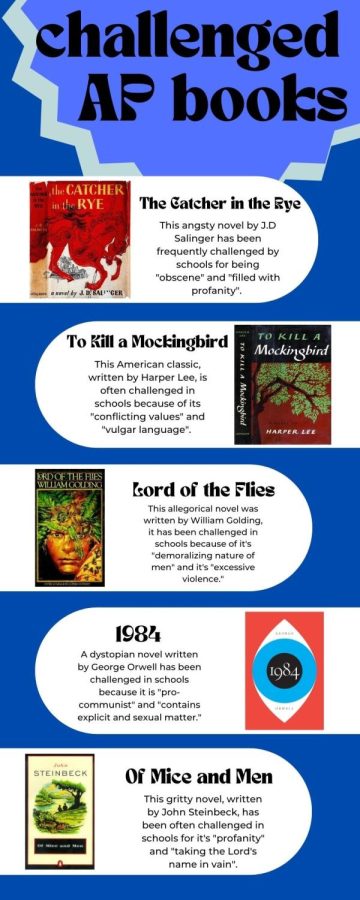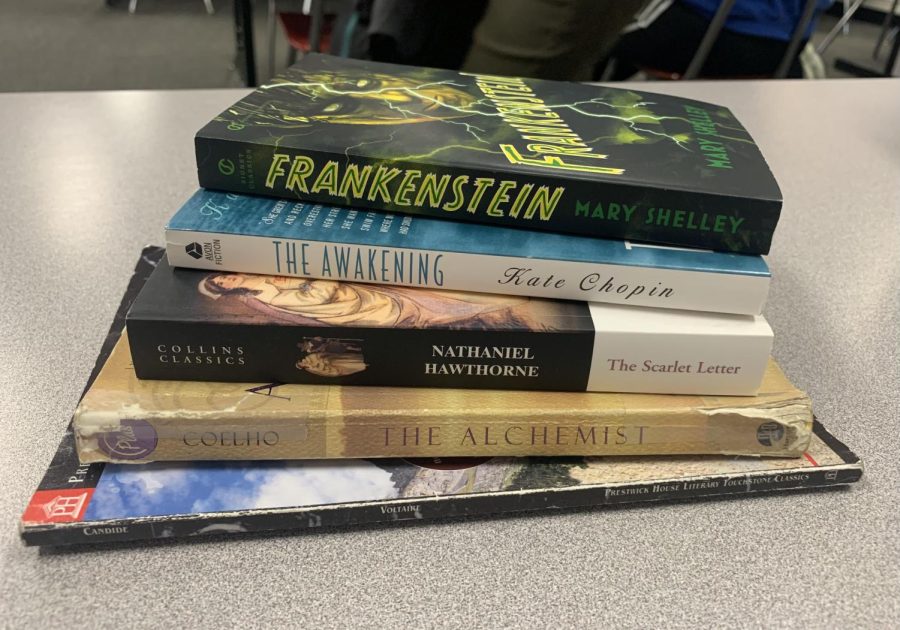Required Reads
Students question the value of AP reading
November 21, 2022
Most students at NAHS have at least one book in their backpack after selecting one of many English courses our school has to offer.
Books, of course, are the common thread that connects these English classes. The school’s AP English courses, on the other hand, require a bit more reading than your average English class. AP English students are usually expected to read one novel per quarter outside of class. For students, this can be intimidating because no one wants to read a boring book at home, let alone write multiple essays and answer questions about it. Of course, as with most things, “boring book” is a subjective term.
“Some of the AP books I have read have actually taught me valuable lessons,” senior Abigail Lewis said. “Like 1984, it taught me that maybe the government isn’t the best.”
Lewis has been in advanced English classes for her entire high school career, so she’s read quite a few “boring books” from the bunch.
“Some of the books, The Great Gatsby specifically, literally just gave me entertainment and helped my mental stability,” Lewis said.
Both students and English teachers are aware that some of the compulsory reading can be tedious and seem unimportant. However, there is a reason why these novels are part of the AP curriculum for students.
“I do believe that AP books benefit students later in life,” English Department Coach Tabitha Vincent said. “Sometimes, I think society writes off the classics as obsolete and unnecessary. However, they are classics for a reason. Not only do they teach the same stories and lessons that modern fiction does, but they are timeless.”
Lewis says that because AP novels are engrossing and provide some form of lesson, she enjoys reading many of them.
“I feel like a lot of the books don’t teach me anything inherently about English, they teach me more about life,” Lewis said.
Some AP novels can help students become ready for life after high school, and life lessons are an important element of what makes a book more fascinating and likable for students in school.
“I hope students learn that human problems haven’t really changed throughout history,” Vincent said. “We can still learn from the issues being discussed in a text written in the 17 or 1800’s. It makes people feel more connected and less isolated in their problems.”
As students get older and read more mature books, some novels can have a profound impact on them, and some memorable stories can stay with them for years.
“My favorite book hands down that I’ve ever read in an AP English class is The Great Gatsby by F. Scott Fitzgerald,” Lewis said. “That book is so good, I’ve read it twice since Mrs. Ponder’s class and I own both versions of the movie.”
Lewis says that after a stressful day, viewing The Great Gatsby soothes her and helps her unwind, and it reminds her of the good times she had in AP Lang last year.
 “It was just so entertaining, I felt like I was actually there and I don’t feel that with books very much,” Lewis said.
“It was just so entertaining, I felt like I was actually there and I don’t feel that with books very much,” Lewis said.
Naturally, teachers have a variety of favorite books as well. Vincent says since she’s the English department coach, she has a basic understanding of the AP curriculum and what books are assigned to students. .
“My favorite AP book would be The Scarlet Letter. I happen to really like the story itself. Plus, I think it teaches the reader to not judge others simply based on assumptions.” Vincent said.
Unfortunately, some books were not well received by students. Every student and teacher has a different opinion on certain books, and their reasoning is also different.
“Candide was my least favorite AP book I have read so far, I was given the choice but I still chose that book and it went over my head.” Lewis said. “I thought it was so funny until I did not get the humor anymore.”
Lewis says she was eager to dive into Candide‘s sarcastic, witty story. That is, until she realized she didn’t get the joke at all. Though, Candide is not the only story that has received negative feedback.
“I tend to have personal problems against authors, especially John Steinbeck because of The Pearl, a book we had to read in ninth grade,” Lewis said. “It was someone else’s story that Steinbeck profited off of.”
Lewis says her problem with most AP books is that there’s not much diversity. Lewis says she wishes there was more representation in required AP readings.
“A lot of the books we read in AP classes are by rich, white men who don’t have much experience outside of that,” Lewis said. “Not to say that all of the books we read don’t have any value, because they do, but I feel like we should get some women and minority authors sprinkled in there.”
AP books, whether diverse or not, are frequently challenged by various schools and parents who believe that the material in the book should not be taught in school. The ultimate goal of many of these parents and schools is to have the book banned or permanently removed from schools.
“I think students should be able to have access to a variety of texts,” Vincent said. “However, I also believe that students and parents should feel comfortable voicing their concerns about the content of a specific book.”
Many students consider book banning an outrageous, dystopian idea of thinking which reflects the very books they are assigned to read in classes.
“I don’t think books should be banned because they’re controversial, I think we should look into that controversy and understand why the controversy is happening,” Lewis said.
Vincent says that she doesn’t think complete book banning will ever be the answer, but she thinks students and parents should be able to have discussions about the content of books.
“Books start conversations, it might not be a great conversation but at least the conversation is happening,” Lewis said.
Controversial or not, books are great assets in helping students learn about society, people, and the world around them. Some AP books even have a greater influence than some might think.
“AP English as a whole completely changed the direction I wanted to go in my life,” Lewis said. “I went into that class wanting to be a pharmacist, then Mrs. Ponder gave us an assignment to read a non-fiction text. It was The Immortal Life of Henrietta Lacks, that book made me realize that I love genetics, and now I’m going to college to study genetics.”


